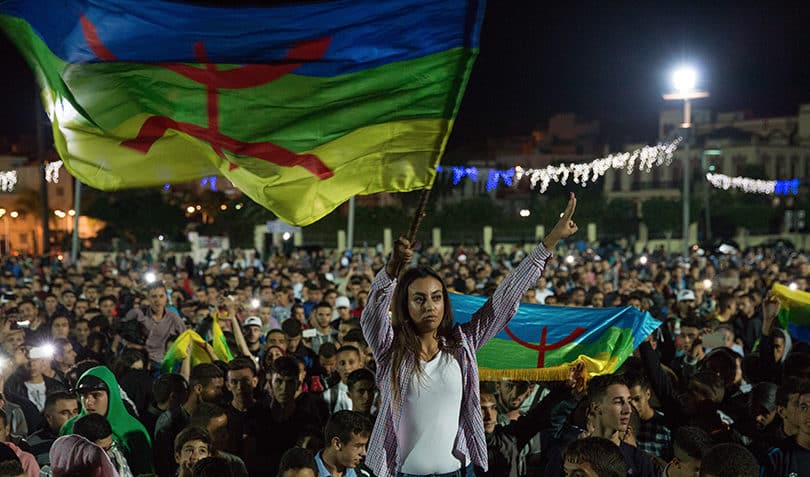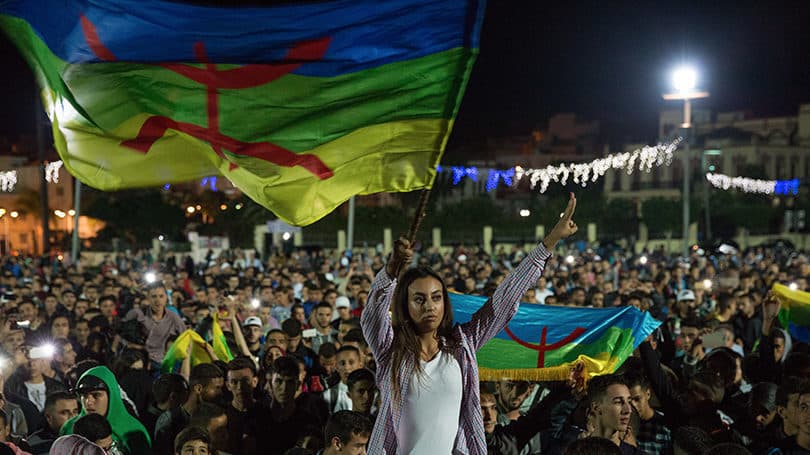The political crises and conflicts in North Africa and the Middle East have fed the awakening of broadcast media competition in the region and a renaissance of the Amazigh movement for identity and rights.
Throughout history, North Africa’s native Berber-speaking populations have been central to the mix of political, social, cultural, and linguistic attributes that have historically rendered the region distinct and attractive to world economic powers. At the dawn of the 20th century, Berbers still constituted a substantial majority of Morocco’s population, and a significant majority of French Algeria; their numbers were smaller in Ottoman Libya and smaller still in France’s Tunisian protectorate.
The Berbers themselves have often confused being Berber with speaking Berber. The dialects spoken in Morocco, Algeria, and Tunisia are not Arabic. When Berbers are asked “who are they?”, they often answer that they are Arabs, although they speak Berber or other North African dialects. This is due largely to the policy of “Arabization”—some would say “brain washing”—of Berbers implemented in the 1920s and strengthened many times during the 20th century (notably in the 1930s,1950s, and 1960s) through broadcasting and national school curricula aiming to assimilate them into the “Arab world.”
The Berbers or Amazigh are an ethnic group indigenous to northwest and northeast Africa, speaking various Berber languages. They are the descendants of the Libyan populations of North Africa all the way from Egypt in the east to the Canary Islands in the Atlantic Ocean, and from the Mediterranean coast at the top of Africa south to the Niger River, including Mauritania and Sudan. Originally, Berber was a generic name given by the Romans to numerous heterogeneous ethnic groups who shared similar cultural, political, and economic practices. It was not a term originated by the group itself.
Ancient Berber tribes included Gaetulians, Maures, Massyli, Garamantes, Augilae, and Nasamones. Although two significant Berber dynasties emerged, the Almoravids in the eleventh century and the Almohads in the twelfth century, the Berber tribes could never unite long enough to eject the numerous conquerors who invaded their lands. Berber history therefore is told as a history of individual kingdoms and alliances.
Rise of the Amazigh Movement
Nationalism began to spread in North Africa during the first decades of the 20th century. Each nationalist movement was shaped by a particular combination of factors; all of them, however, highlighted the Arab and Islamic components of their collective identities, downplaying or ignoring the Berber ones.
Berbers actively participated in the struggles for independence in both Algeria and Morocco as well as in Mali, Niger, Mauritania, Soudan, Tunisia and Libya, often in leadership roles and frequently in armed resistance. This pattern would continue during the decades after independence, as all the successive governments of these states placed supreme value on the Arabization of the educational system, public life, and public institutions. The state’s typical overview of Berber identity was that it should be consigned to the realm of folklore.
As the number of Berber speakers declined, the modern Amazigh identity movement grew. Berbers began to demand a reexamination of the underlying premises of their countries’ collective identities–a reexamination that has brought the Berber language and culture to center stage. The movement also demanded that dire conditions such as lack of jobs and poverty affecting much of the rural Berber world be addressed. As ruling regimes struggled to maintain their legitimacy after a half century of independence, the Berber “question” has since taken on a new political importance in North Africa.
The early movement has both given birth and propelled an important cultural assertion of Amazigh identity in all North Africa countries, leading to such positive developments as the establishment of the Royal Institute for Amazigh culture (IRCAM) in Morocco, recognition of the Tamazight language in the Moroccan and Algerian Constitutions as an official and national language, the creation of official Amazigh TV, radio, news, and fine arts outlets for theater, literature, and dance, and the full recognition of language and civilization in Algeria.
Despite these achievements, the Berbers continue to accuse the authorities in North African countries of supporting and accelerating Arabization of the Berbers. Although the Berber language is now taught at a certain level and in a few schools in Morocco and Algeria, that is seen only as a measure to pacify Berbers, deflate political awareness movements in North Africa, and present a democratic face to international organizations and governments. Thus, the movement continues to evolve.
A New Focus on Media
The quest for economic and political hegemony over North Africa is a new/old policy adopted by many countries around the world. The US, Russia, the European Union, and lately Turkey, Saudi Arabia, Qatar, and the United Arab Emirates have all exercised policies to gain control to some degree or other. These geo-political competitions have manifested themselves in diverse ways and have led to many critical points in North Africa beginning with the Libyan and Algerian political crises, the Moroccan-Algerian conflict over the Sahara, and the Malian-Sahel political conflicts.
History has taught that this region has always been the focus of tactical plays for economic and political power, and it remains strategic in modern times. Only now, such competition has led to the rise of broadcasting interests through new TV and radio stations to invest in this region rich in news, propaganda, as well as the “virgin” culture of first nation people in North Africa: the Berbers.
The countries have learned the importance of broadcasting in its ability to affect the local people, the region, and the world’s point of view. Much like in French colonial times, no new political order or imperial new deal arises without a professional broadcast mechanism to influence and direct people’s point of views and beliefs.
The Gulf Crisis and Qatar’s Broadcast Channel
Qatar was the first country to discover the importance of broadcasting first in the Middle East. It gained traction in North Africa twenty years later, after the democratic “Spring” or so-called “Arab Spring” and then during the Gulf crisis, and especially after the rise of ISIS and the devastation that ISIS wreaked in the MENA region.
When President Donald Trump demanded publicly that Saudi Arabia, the UAE, and Qatar finance the rebuilding of Syria after the war, Qatar refused. Trump then accused Qatar of terrorism and supporting the Muslim Brotherhood throughout the world. Saudi Arabia and the UAE also accused Qatar, which had refused to pay its “share” in the massive war bill, of intervening in their internal affairs through the broadcast programs of Aljazeera TV. They also accused it of supporting the Muslim Brotherhood and Al-Qaida. In fact. Saudi Arabia and UAE did their utmost to limit Qatar’s broadcasting in the region and asked all their allies to expel the Aljazeera offices in their countries. Finally, they ordered an economic embargo on Qatar beginning in 2017 through the mechanism of the Gulf Cooperation Council (GCC), the political and economic alliance of six Middle Eastern countries including Saudi Arabia, Kuwait, the United Arab Emirates, Qatar, Bahrain, and Oman.
The conflict, which began as a media skirmish over Qatar’s alleged support of ISIS, intensified after Saudi Arabia and the UAE sought new allies in the Levant and North Africa. The clash deepened as both sides pursued separate alliances using any means necessary such as money, weapons, and/or policies.
To buy the silence of the global powers, Saudi Arabia signed huge weapons contracts with countries such as the US, Russia, the UK, France, and Germany. It also handed over cash directly to the Trump administration. Suddenly, all these democracies went blind and mute when Saudi journalist Jamal Khashoggi was brutally assassinated by the Saudi authorities in their Consulate in Turkey in October 2018.
While broadcasting had never been of much interest to the Arabs, the rich Gulf princes who used to spend their wealth on fun, fast cars, fashion, horse races, mansions, and football clubs, have finally realized that what Qatar had started earlier with its Aljazeera channel presented an incredible opportunity. They belatedly have realized that broadcasting can change the world’s perceptions, as Aljazeera did in favor of Qatar and against the Saudis and Emirates during the Gulf crisis.
The Battle of Broadcasting and the Renaissance of the Amazigh Movement
With that realization, they are now seeking to limit the impact of Qatar’s broadcasting in North Africa, and to replace it with a new TV channel, “MBC Morocco,” to be broadcast from Mauritania. Saudi Arabia with the help of Turki Al-Sheikh, the number one enemy of Morocco, is reportedly working on films about prostitution and drugs in Morocco to mar its image. Meanwhile the Emiratis are financing TV channel Sky News Arabia’s new TV channel “Sky News Morocco” whose launch will be overseen by a former Emirati intelligence officer named Ahmed al-Rabiaa.
The lack of democracy and independent broadcast media in North African countries are driving Amazigh people now to look for news on other TV stations.
Aljazeera Arabic was the first TV channel that understood this and the first to start a TV channel covering North Africa in Arabic, notwithstanding that the population is primarily Berber and Berber speaking. Yet broadcast competitors are emerging that are focusing on North Africa and on local and international events that have taken place since the so-called “Arab Spring.”
Channels such as France 24 Arabic, Alarabiya, and Sky News are analyzing the local and regional crises from their perspectives, unmasking the supposed “impartiality” of Aljazeera. To be sure, Aljazeera was the first channel to cover the first Berber demonstration in Rabat in 2007, the Boumalne Dades Black spring in 2008, and to address Berber identity issues in Morocco. But the competitors have made Berbers aware of the importance of the capabilities of broadcasting not only to mislead the public through propaganda, but also to correct rumors and so-called “fake” news, falsification of facts and history, and to highlight the danger of losing their Berber identity and language.
Up until now, the broadcasts of local Amazigh TV channels have presented only the “folklorization” of Amazigh culture and identity through its music and dance. But just as the Arabs have woken up as to the importance of broadcast media to gain political hegemony, North African Berbers are now realizing its potential. They are launching their own independent social media outlets, TV broadcast channels, and radio stations to combat the continuing Arabization of future generations of Imazighen. Indeed, media is becoming a channel for another renaissance of the Amazigh movement to reclaim Berber identity and rights.
The views expressed in this article are the author’s own and do not necessarily reflect Amazigh World News’ editorial views.
This article was originally published on Inside Arabia. Read the original article.
[ads2]

